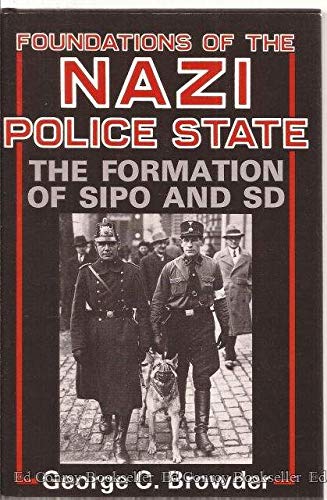George C. Browder
After three years service in Air Force intelligence, I pursued graduate studies at the University of Wisconsin, where I focused on police and security agencies in the modern western world. Working under Robert Koehl, an expert on the SS, I ended with a focus on the Nazi police and security agencies, which was the only one for which much primary source material was available. Since then, I taught mostly at the State University of New York at Fredonia, from which I retired in 2000, to resettle near family in Germantown, Tennessee.
I have researched and written about the Nazi Police state now for over five decades. When I began, I was an early participant in what soon came to be called the debate between intentionalists and functionalists. Before such labels were applied to the participants, I had called my position evolutionist, which more accurately describes it than "functionalist" which many reviewers assigned to my work. All such terms referred to the arguments over how much or how soon Hitler had planned the Holocaust or any other aspect of the Third Reich, including WWII. I presently find myself in the synthesis or consensus position that was emerging by the turn of the century.
My first book focuses on the power struggle among the Nazi leadership to win Hitler's approval for the creation of the kind of police state that would serve his purposes. The ultimate product was the SS-Police and concentration-camp complex under Heinrich Himmler - the hands-down winner. The second book related how the major components, the Gestapo, the Criminal Police (regular detective branch), and the SS-Security Service (SD) evolved, and the diverse composite of men who were drawn into these services.
As time passed, I became more interested in what has now become a booming subfield among scholars in Germany - Taeterforschung, or the study of Holocaust perpetrators. Readers of my two books will be able to see where I stood in these developments among the students of the Third Reich, as well as my early contributions to perpetrator research.
I continue pursuing this interest since retirement, but now it shares my attention with others.
My latest book is a product of my having been involved in the History Commission of my new hometown. Since I argued for efforts to take advantage of Civil War tourism, as the professional historian in the group, I was challenged to do the research to come up with suitable subjects for markers. Although that led to no action, I thought I had enough material for a "little" book on the town's war experiences. That led to the discovery that the consequences of the war on the people and their community were more important. Indeed, in addition to the predictable physical destruction and the political and economic consequences of emancipation and Reconstruction, I discovered that a community that had experienced over three years of guerrilla warfare would suffer collectively from PTSD.
Popular items by George C. Browder
View all offers-
Foundations of the Nazi Police State: The Formation of SIPO and SD
Browder, George C.
Item prices starting from
View 9 offersUS$ 20.13
-
Germantown during the Civil War Era: A Reversal of Fortune
Browder, George C.
Item prices starting from
View 10 offersUS$ 35.17
-
A Reversal of Fortune: Germantown, Tennessee, during the Civil War Era: Germantown, Tennessee, during the Civil War Era
Browder, George C.
Item prices starting from
View 18 offersUS$ 40.78
-
Hitler's Enforcers: The Gestapo and the SS Security Service in the Nazi Revolution
Browder, George C.
Item prices starting from
View 12 offersUS$ 67.49




